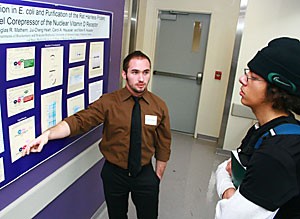Although biology was the theme at the 18th-annual Undergraduate Biology Research Program Conference Saturday, the overriding message was communication.
Part of the reason UBRP puts on the conference is to give undergraduate students practice in presenting their scientific research findings, said Carol Bender, director of UBRP.
“”Communication is an essential skill – particularly in science,”” Bender added. “”To care about science, people have to understand it.””
Devin Wiley, a chemical engineering senior, said the conference gives young scientists practice in communicating to people who understand the research and those who do not.
“”If we don’t have these conferences, that information doesn’t get out as easily,”” Wiley said.
Biochemistry senior Stephanie Hartz said the conference also gives presenters a chance to discover new ideas for their research from other presenters’ work and from visitors’ suggestions.
The presenters, who rotated in one-hour shifts, were still smiling and happy to share their knowledge at the end of the day.
“”I enjoy talking about this,”” said Alice Ferng, a biochemistry junior.
Ferng said while she has always wanted to be a
Communication is an essential skill – particularly in science.
– Carol Bender,
director of UBRP
physician, UBRP has inspired her to pursue an M.D./Ph.D., which is a combination of a medical degree and a Ph.D.
The research topics varied from trying to determine whether ancient and modern humans bred at some point to discovering the function of a tiny part of a bee’s brain or finding out whether bio-diesel is the fuel of future public transportation.
Hartz examined how products from bone cancer cells affected sensory neurons.
She said she was surprised when a pain neuron experienced necrotic death, or essentially exploded, within 30 minutes of exposure to the product, a short time for cell death.
Hartz’s research could eventually lead to new treatments for cancer pain.
“”In the treatment for pain, there are very few options,”” Hartz said.
Wiley and Laurel Cox, a molecular and cellular biology junior, are trying to replace damaged cartilage in knees by using stem cells obtained from adipose, or fat, tissue.
A conventional treatment for damaged knee cartilage is to drill holes in healthy tissue and transplant it onto the damaged area, Cox said.
Cox and Wiley harvest the stem cells from fatty tissue, grow the cells and implant them onto biologically-compatible plastic scaffolds and place them in the knees of dogs, who put similar weight loads on their knees as humans.
The scaffolds should absorb into the body about 18 months after enough bone has grown to replace what was removed – hopefully, with new cartilage grown in place, Cox said.
Undergraduates dominated the conference, but high school students attended, too.
Ilianna Ceniceros, a 16-year-old San Miguel Catholic High School student, presented her work in mapping mutations in arabidopsis, commonly known as a mustard plant.
In her research, Ceniceros discovered that rice and tomatoes have a receptor that is the same as that in arabidopsis.
Ceniceros saw the conference as a positive experience, saying that it gives high school participants opportunities and advantages that other students interested in science do not have.
The students’ faculty mentors provide 60 percent of the funding for student research, Bender said. The other 40 percent is primarily provided by grants from organizations like the Howard Hughes Medical Institute, the National Institutes of Health and the University of Arizona.
Out of the 100 students involved in UBRP, 86 made presentations, said Bender, who has been director of the program for its 18-year run.
Each presenter received a certificate of participation and a $25 gift card to the UA Bookstore.
Posters describing the presentations will be on display on the second and third floors of the Life Sciences-South building until Friday.
The application process for next year’s conference is under way, Bender said.
The deadline for applications is Feb. 1 at 4 p.m. Applications and more information are available online at http://ubrp.arizona.edu
Anyone with questions about the program may e-mail Carol Bender at bender@email.arizona.edu









